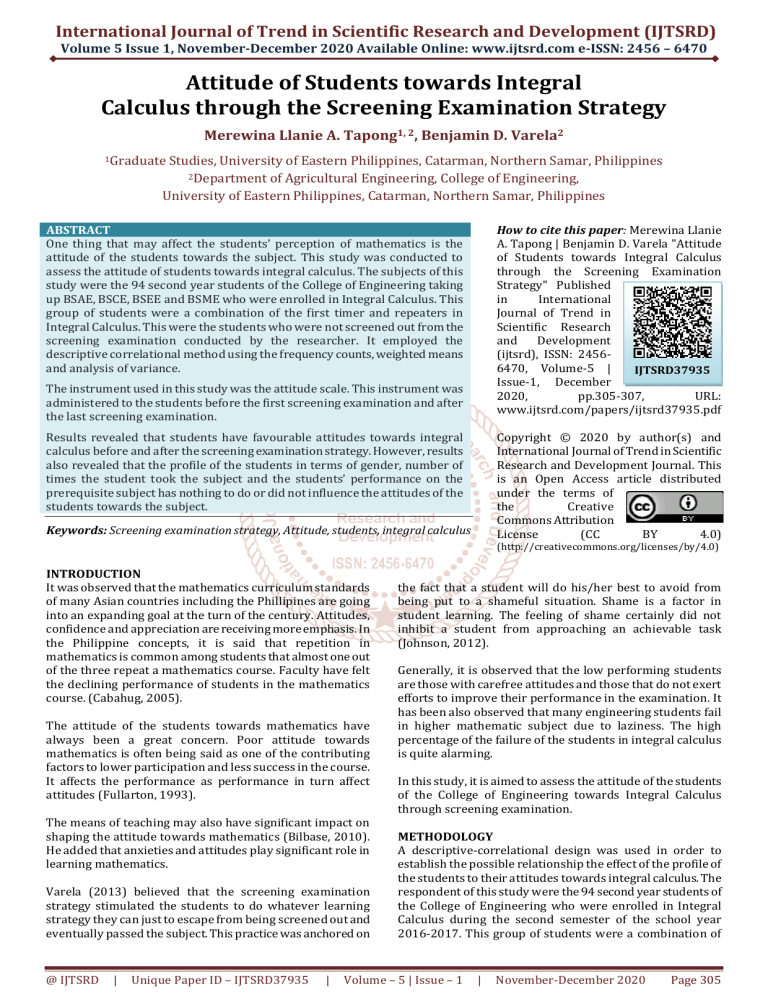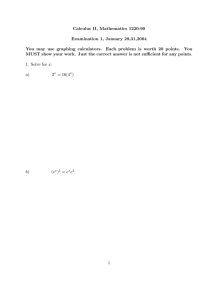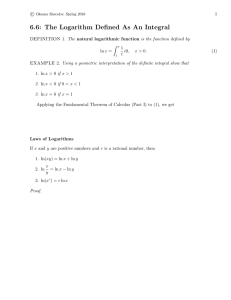
International Journal of Trend in Scientific Research and Development (IJTSRD)
Volume 5 Issue 1, November-December 2020 Available Online: www.ijtsrd.com e-ISSN: 2456 – 6470
Attitude of Students towards Integral
Calculus through the Screening Examination Strategy
Merewina Llanie A. Tapong1, 2, Benjamin D. Varela2
1Graduate
Studies, University of Eastern Philippines, Catarman, Northern Samar, Philippines
2Department of Agricultural Engineering, College of Engineering,
University of Eastern Philippines, Catarman, Northern Samar, Philippines
How to cite this paper: Merewina Llanie
A. Tapong | Benjamin D. Varela "Attitude
of Students towards Integral Calculus
through the Screening Examination
Strategy" Published
in
International
Journal of Trend in
Scientific Research
and
Development
(ijtsrd), ISSN: 24566470, Volume-5 |
IJTSRD37935
Issue-1, December
2020,
pp.305-307,
URL:
www.ijtsrd.com/papers/ijtsrd37935.pdf
ABSTRACT
One thing that may affect the students’ perception of mathematics is the
attitude of the students towards the subject. This study was conducted to
assess the attitude of students towards integral calculus. The subjects of this
study were the 94 second year students of the College of Engineering taking
up BSAE, BSCE, BSEE and BSME who were enrolled in Integral Calculus. This
group of students were a combination of the first timer and repeaters in
Integral Calculus. This were the students who were not screened out from the
screening examination conducted by the researcher. It employed the
descriptive correlational method using the frequency counts, weighted means
and analysis of variance.
The instrument used in this study was the attitude scale. This instrument was
administered to the students before the first screening examination and after
the last screening examination.
Copyright © 2020 by author(s) and
International Journal of Trend in Scientific
Research and Development Journal. This
is an Open Access article distributed
under the terms of
the
Creative
Commons Attribution
License
(CC
BY
4.0)
Results revealed that students have favourable attitudes towards integral
calculus before and after the screening examination strategy. However, results
also revealed that the profile of the students in terms of gender, number of
times the student took the subject and the students’ performance on the
prerequisite subject has nothing to do or did not influence the attitudes of the
students towards the subject.
Keywords: Screening examination strategy, Attitude, students, integral calculus
(http://creativecommons.org/licenses/by/4.0)
INTRODUCTION
It was observed that the mathematics curriculum standards
of many Asian countries including the Phillipines are going
into an expanding goal at the turn of the century. Attitudes,
confidence and appreciation are receiving more emphasis. In
the Philippine concepts, it is said that repetition in
mathematics is common among students that almost one out
of the three repeat a mathematics course. Faculty have felt
the declining performance of students in the mathematics
course. (Cabahug, 2005).
The attitude of the students towards mathematics have
always been a great concern. Poor attitude towards
mathematics is often being said as one of the contributing
factors to lower participation and less success in the course.
It affects the performance as performance in turn affect
attitudes (Fullarton, 1993).
The means of teaching may also have significant impact on
shaping the attitude towards mathematics (Bilbase, 2010).
He added that anxieties and attitudes play significant role in
learning mathematics.
Varela (2013) believed that the screening examination
strategy stimulated the students to do whatever learning
strategy they can just to escape from being screened out and
eventually passed the subject. This practice was anchored on
@ IJTSRD
|
Unique Paper ID – IJTSRD37935
|
the fact that a student will do his/her best to avoid from
being put to a shameful situation. Shame is a factor in
student learning. The feeling of shame certainly did not
inhibit a student from approaching an achievable task
(Johnson, 2012).
Generally, it is observed that the low performing students
are those with carefree attitudes and those that do not exert
efforts to improve their performance in the examination. It
has been also observed that many engineering students fail
in higher mathematic subject due to laziness. The high
percentage of the failure of the students in integral calculus
is quite alarming.
In this study, it is aimed to assess the attitude of the students
of the College of Engineering towards Integral Calculus
through screening examination.
METHODOLOGY
A descriptive-correlational design was used in order to
establish the possible relationship the effect of the profile of
the students to their attitudes towards integral calculus. The
respondent of this study were the 94 second year students of
the College of Engineering who were enrolled in Integral
Calculus during the second semester of the school year
2016-2017. This group of students were a combination of
Volume – 5 | Issue – 1
|
November-December 2020
Page 305
International Journal of Trend in Scientific Research and Development (IJTSRD) @ www.ijtsrd.com eISSN: 2456-6470
first timers and repeaters. These students were the students
that were retained in the class after the conduct of the
screening examination. These students were exposed to a 5
set of screening examination and passed the retention score
of 10 points out of 100 points during the first screening
examination, 20 points on the second, 30 points on the third,
40 points and 50 points on the fourth and fifth screening
examination. These screening examinations was validated by
the other professors who were handling the same subject.
The questionnaire on the students’ attitude towards integral
calculus was patterned from the study of Pelonia. These was
also validated and pre tested to students who enrolled in
Integral Calculus that was being handled by other professors
in the college. These questionnaires were given to the
students before the start of the first screening examination
and after the last screening examination.
The data gathered were statistically analyzed by measure of
weighted mean, percentages. To show the relationship
between attitude of the students towards integral calculus
and the profile of the students in terms of gender, number of
times the students enrolled in integral calculus, multiple
regression was used. The following research instrument
were used in this study
Attitude scale. This was administered to the students
before the first screening examination and after the last
screening examination. This was used to assess if there
is significant relationship between the attitudes of the
students towards Integral Calculus and the profile of the
students in terms of gender, number of times the
students has enrolled in Integral Calculus and the grade
of the students in the pre requisite subject which is the
Differential Calculus.
A five-set of 10 items equivalent to 100 points screening
examination questionnaire which was administered to
the students every after the end of the discussion of
every chapter up to the 5th chapter.
RESULTS AND DISCUSSION
The attitude of students towards integral calculus before the
first screening examination was conducted and after the last
screening examination are almost the same which are
favorable. This means that the introduction of the screening
examination strategy to engineering mathematics students
could be possible because it did not negatively affect the
attitude of the students towards the subject. Students can
feel the importance of integral calculus as a preparatory to
higher mathematics subjects regardless of what strategy be
employed to them.
On the attitude of the students on integral calculus before
and after screening examination. The attitude grand mean
before the screening examination was given was 3.90
interpreted to have a favourable attitude towards integral
calculus. After the fifth and last screening examination, the
measured grand mean attitude of students was found to be
3.92, also has a favourable attitude. Moreover, students have
a high favorable attitude before and after screening
examination on the statement: “I can see much importance in
integral calculus as a preparatory to higher mathematics.
Also, on the statement:”integral calculus is as important as
other subjects because it provides foundation for
understanding of a higher level of mathematics and general
engineering subjects.
However, there was a change in attitude from a favourable
attitude before the first screening examination was
conducted to undecided after the last screening examination
on the statement:” I feel sure of myself in integral calculus
and I think integral calculus is fun. This is very normal
attitude of the students since they already faced the
challenge of screening examination. The notion of most of
the engineering students that integral calculus is a very
difficult subject may have triggered them to be undecided.
The attitude of the students towards integral calculus before
and after the screening examination is presented in Table 1.
Table 1 Attitude of the students towards Integral Calculus before and after the Screening Examination
Before Screening
After Screening
Weighted
Weighted
STATEMENT
Examination
Examination
Mean
Mean
Interpretation
Interpretation
1. Integral Calculus is an stimulating subject
4.02
Favorable
4.26
Highly Favorable
2. Integral Calculus thrills me and I like it better
3.95
Favorable
3.79
Favorable
than the other subjects.
3. I can see much importance in Integral calculus
as a preparatory to higher mathematics
4.35
Highly Favorable
4.21
Highly Favorable
subjects
4. Integral calculus develops my ability to think
4.23
Highly favorable
3.88
Favorable
logically and reasons out correctly
5. Integral Calculus is a very difficult subject
3.71
Favorable
4.12
Favorable
6. I enjoy the challenges of Integral Calculus
3.98
Favorable
3.76
Favorable
problems
7. I enjoy seeing how rapidly and accurately I can
3.64
Favorable
3.72
Favorable
solve Integral Calculus problems
8. Integral Calculus is as important as other
subject because it provides foundation for
4.33
Highly Favorable
4.28
Highly Favorable
understanding of higher level mathematics and
general engineering courses
9. I feel sure of myself in Integral Calculus
3.41
Favorable
3.32
Undecided
10. I think Integral calculus is fun
3.48
Favorable
3.32
Undecided
TOTAL
39.00
39.21
GRAND MEAN
3.90
Favorable
3.91
Favorable
@ IJTSRD
|
Unique Paper ID – IJTSRD37935
|
Volume – 5 | Issue – 1
|
November-December 2020
Page 306
International Journal of Trend in Scientific Research and Development (IJTSRD) @ www.ijtsrd.com eISSN: 2456-6470
Results also revealed that the profile of the students in terms
of gender, number of times the students enrolled and the
grade of the students in the pre requisite subject which is the
differential calculus did not affect the students’ attitude
towards integral calculus, hence they did not have significant
relationship.
The success of employing the screening examination
strategy to students relies on the attitude of the students
towards the subject. With this, it strengthen the claim of
Fullarton that the attitude towards mathematics have always
been a great concern because it is said as one of the
contributing factors to lower participation and less success
in the course.
CONCLUSIONS:
Based on the results of the study, the following conclusion
were drawn:
1. The introduction of the screening examination strategy
to engineering mathematics students could be possible
because it did not negatively affect the attitude of the
students towards the subject.
2. Students can feel the importance of Integral Calculus as
a preparatory to higher mathematics subject regardless
of what strategy be employed to them.
3. The success of employing the screening examination
strategy to students relies on how the students accept it.
There were students who perceived screening
@ IJTSRD
|
Unique Paper ID – IJTSRD37935
|
examination strategy as a threat to their studies on the
thought that it could be a hindrance for them to
complete the program on time if they will be screened
out.
ACKNOWLEDGEMENT
The author would like to thank he CHED k12 transition
program for the thesis grant and the University of Eastern
Philippines through its Faculty Development Program for the
support.
CONFLICT OF INTEREST
None
LITERATURE CITED
[1] BILLBASE, S. 2010. Images, Anxieties, and Attitude
towards Mathematics, Retrieved from: Educational
Resources Information Center.
[2]
CABAHUG, L. 2005. The Academic Performance in
Basic Mathematics of UPV Cebu College Freshmen
from School Year 2000-2001 to 2003-2004: A basis
for Admission to Degree. FULLARTON, 1993.
Mathematics Anxiety, Mathematics Performance and
Academic Hardiness
[3]
PELONIA, et al. 2014. The Use of Manipulative in
Teaching Basic Mathematics, University of Eastern
Philippines, Catarman N. Samar.
Volume – 5 | Issue – 1
|
November-December 2020
Page 307



